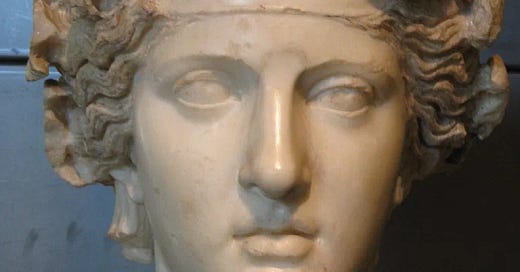IN WESTERN PHILOSOPHY AND AESTHETICS a contrast is sometimes made between the Dionysian and the Apollonian. Made famous by Nietzsche, this schema was first used to describe the thought and art of Ancient Greece. On the Apollonian end we have all that is rational, intentional, structured, abstract, or well ordered; on the Dionysian side we find all that is passionate, instinctual, chaotic, sensual or protean. The Apollonian strain of western culture is associated with daylight, law, mathematics, sculpture, discipline, and the city; the Dionysian strain is associated with nightfall, violence, poetry, music, drunkenness, and nature. The Apollonian element is stereotypically male; the Dionysian element is stereotypically female. The Apollonian ideal is realized by the solitary philosopher solemn in thought. The model Dionysian is an ecstatic madman frenzied with the crowd.
Many trace the contest between the Apollonian and Dionysian halves of the soul across the history of Western civilization. This dichotomy explains tensions in our 21st century culture just as well as it explains the works of ancient Greece and Rome. But if Nietzsche’s schema is enduring, is it also universal? Does the battle between the Apollonian and the Dionysian rage in all civilizations—or just the Western one?
Two years ago I posed this question to a friend of mine, who writes on Substack under the pen-name “
.” Born in China but trained as a classicist in the West, Antonius is equally at home reading Horace and Du Fu. Few are better qualified to make comparisons between ancient cultures East and West. We discussed the question for several hours. Only later did I discover that Antonius made a record of our conversation. He recently published a highly stylized version of it on his Substack: “On the Strangeness of the Greeks and Other Subjects: Part I” and “On the Strangeness of the Greeks and Other Subjects: Part II.”Antonius has rewritten our conversation in the form of a classical dialogue. Some may find this style annoying, but if you have dipped your toes in Cicero or Xenophon I trust you will find this 21st century classical dialogue entertaining.
Our conversation was wide-ranging. Among other topics, we discuss the following questions:
Is Daoism “Dionysian?” Is Confucianism “Apollonian?”
Why is classical Greek culture so horrified with children, procreation, and family life?
How do Daoist and Bacchic attitudes towards sex compare? Were ancient Chinese and ancient Greek sex rites equivalent?
Does the jianghu ethos of Chinese martial arts and wuxia tales have a counterpart in the West? Is the modern Communist Party of China more jianghu or more Confucian?
How do we rank ancient Chinese philosophers in terms of IQ?
Who would a neo-Confucian scholar find more sympathetic—Kantian ethics or Antigone?
What does Greek anti-natalism say about western civilization as a whole?
None of our answers to these questions are as developed as they might be if I defended or presented them in a proper essay. That is the weakness of this genre. On the other hand, between Antonius and myself there are a dozen observations worthy of a sustained essay that would never have been raised at all save for this dialogue. Most of these ideas I am still playing around with; I am not sure any are correct, and do not have the time it would take to present any at essay-length. The dialogue format then allows us to present a series of tentative ideas that would not otherwise be published. I hope you find them worth pondering.
Read the full thing HERE.
————————————————————-
Your support makes this blog possible. To get updates on new posts published at the Scholar’s Stage, you can join the Scholar’s Stage Substack mailing list, follow my twitter feed, or support my writing through Patreon. If you found this post worth reading, you might find some of my other essays on ancient Greece or Ancient China up your alley. Check out “History is Written by the Losers,” “How I Taught The Iliad To Chinese Teenagers,” “The Radical Sunzi,” “Not Everyone Likes Sunzi,” “On Days of Disorder,” “Beware the Alcibiades Point,” “Everybody Wants a Thucydides Trap,” and “Men of Honor, Men of Interest”
—————————————————————-





